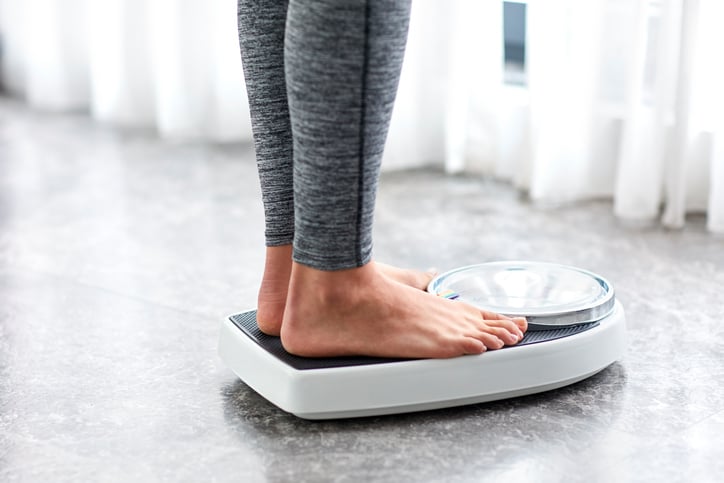The Top 4 Ways to Lose Weight WITHOUT Dieting

Now that the holidays are behind us, it’s time to take stock of where we are, take a good look at our goals (you did set goals, right?!), and get busy to achieve them. If you’re like the majority of Americans and one of your goals is to lose weight, you’re in the right place. But what will it take to peel off those extra winter layers? Well, I have some good news… losing the weight is NOT going to involve dieting.
Wait… what?!
Yes, you read that correctly, you can lose weight without dieting, and it won’t depend on willpower either.
Like what you’re reading so far, then read on for four simple ways to lose weight without dieting:
What Will It Take to Lose Weight Without Dieting?
So, if you’re not going to have to diet to lose weight, what, exactly, will cause you to release that excess body fat that no longer serves you? The answer is a variety of lifestyle changes that can, over time, help you slim down virtually effortlessly.
According to Brian Wansink, a psychologist at Cornell University, small changes to your routines made over time are more effective than depending on willpower alone to change your habits. Ultimately, permanently changing your regular habits is what will make you successful, not only right away, but in the long term as well.
1) Slow Down and Be Mindful
You’ve probably heard you should “slow down” when you eat, but why? It’s simple: when you slow down, your body can better process your actions. For example, did you know it can take your brain up to 20 minutes to register when you’ve eaten something?
By slowing down your eating, your brain can now process what and how much you’re eating, which can help you eat less, overall. Here’s how to take it slowly: start by chewing your food for a few extra bites, putting your fork down on the plate in between bites, and sipping on water during your meal to slow yourself down.
An added benefit to slowing it down and being more mindful (paying attention) as you eat is easy portion control—you’ll automatically eat less volume. And, if you’re satisfied with less food, you’ll naturally err toward smaller portions and less food overall.
Another easy way to trick yourself into enjoying smaller portions is to simply downsize your plate. You’ll still have a full plate; it’ll just be smaller, so you’ll take in less calories.
Mindful eating also helps take the stress out of eating quickly and makes it a more enjoyable and sensory experience. Being mindful is a great practice across the board but when applied to your eating style, it can really help you avoid unnecessary weight gain and even help you lose weight without dieting.
2) Monitor Your Environment
No, we’re not talking about the great outdoors. We’re talking about the foods you keep in the house and ensuring they’re aligned with your fitness goals and getting rid of the stuff that doesn’t serve you. We all know if it’s in the house, no matter how strong you think your willpower is, eventually, you or someone you love will eat it.
So, if you live with other people and you want to lose weight without dieting, enlist their support as well. Clean out your kitchen and get rid of the unhealthy processed foods, snacks, desserts, chips, and candy, and replace them with healthy alternatives. You need to create a supportive environment from all angles, including family and roommates, the foods you keep in the house, and your daily habits. Set yourself up for success.
Take an inventory of your habits. Do you tend to reach for junk food after you’ve had a long day and you’re tired? When no food has been prepared and you’re feeling rushed for time? Are you tempted to eat desserts just because you know they’re in the house? Are you able to portion out snacks from a super-sized bag instead of eating directly from the bag? Want to easily trim down without a lot of drama? Identify your triggers, and remove them from your environment.
On the flip side, you’ll want to prepare for success. That may mean keeping fresh cut-up veggies in the fridge for an easy grab when you rush in or out the door. Or cooking in bulk, so you don’t make bad food choices because nothing’s prepared. Plan and prep your meals for the week, and when you’re at the grocery store, only put the items in the cart you need to make your meals and that you know will nourish your body with healthy nutrition. If you don’t want it in your body, then don’t bring it in the house!
3) Hack Your Sleep
Yes, it’s true that getting better sleep, and possibly more sleep, can help you lose weight without dieting.
It’s a relatively well-known fact that too little sleep can cause you to overeat and eat the wrong foods (like those with a lot of sugar). In addition, consuming caffeine and being sleep-deprived can awaken food cravings that you wouldn’t usually have.
In a study published in Psychoneuroendocrinology, researchers found that skimping on sleep caused people to feel a false sense of hunger and to reach for unhealthy foods and larger portions. In fact, The American Journal of Epidemiology has published a number of studies which show an association between reduced sleep and significant weight gain. In one of the studies, women sleeping between 5 and 6 hours a night gained up to 30 pounds more over time than did their counterparts who got in a solid 7 to 8 hours of sleep per night.
To make matters worse, a lack of sleep leads to increased levels of cortisol, the stress hormone, and this can both slow the release of growth hormone as well as lead to weight gain. In addition, not getting enough zzzzs can mean your body doesn’t process protein as well as it should, and that can hinder your ability to add and even maintain muscle mass, the body’s most powerful calorie burner.
4) Face Facts with Consistent Tracking
Tracking yourself can have measurable benefits (pun intended). Usually, when you don’t monitor your weekly progress, it’s because you’ve been on a food-free-for-all. You’re probably afraid of what the scale might show, so you skip your measurements and tracking. Yet this “ostrich head in the sand” approach is not useful.
In fact, your chosen ignorance can compound quickly, leaving you with a surge in weight. When this happens, you’re setting yourself up for frustration and disappointment since you’ll probably need to restart the whole weight-loss process again, at a higher weight than when you started.
How do you avoid this situation? Be consistent with your tracking of both body weight and circumference. It’s a good idea to pick some areas and always measure in the same spots each time. Common measurements include waist, hips, upper arms, and thighs. You can even track your body fat with calipers or a digital body fat scale.
We recommend weekly or bi-weekly measurement sessions. Always strive to create the same environment each week. For example, weigh yourself first thing in the morning on the same day of the week. Then keep track of your measurements on a sheet of paper or spreadsheet.
Lastly, take some pictures from the front, side, and back in some revealing clothing. It doesn’t need to be skimpy, but it should show your shape. You don’t have to share these with anyone, but it will be fun and motivating to look back to see how far your small, consistent changes have taken you.
The important thing is to notice the changes over time. You’ll see the numbers on the scale drop, the inches melting away, and your clothing getting looser as you practice these simple steps overtime. All without dieting!







